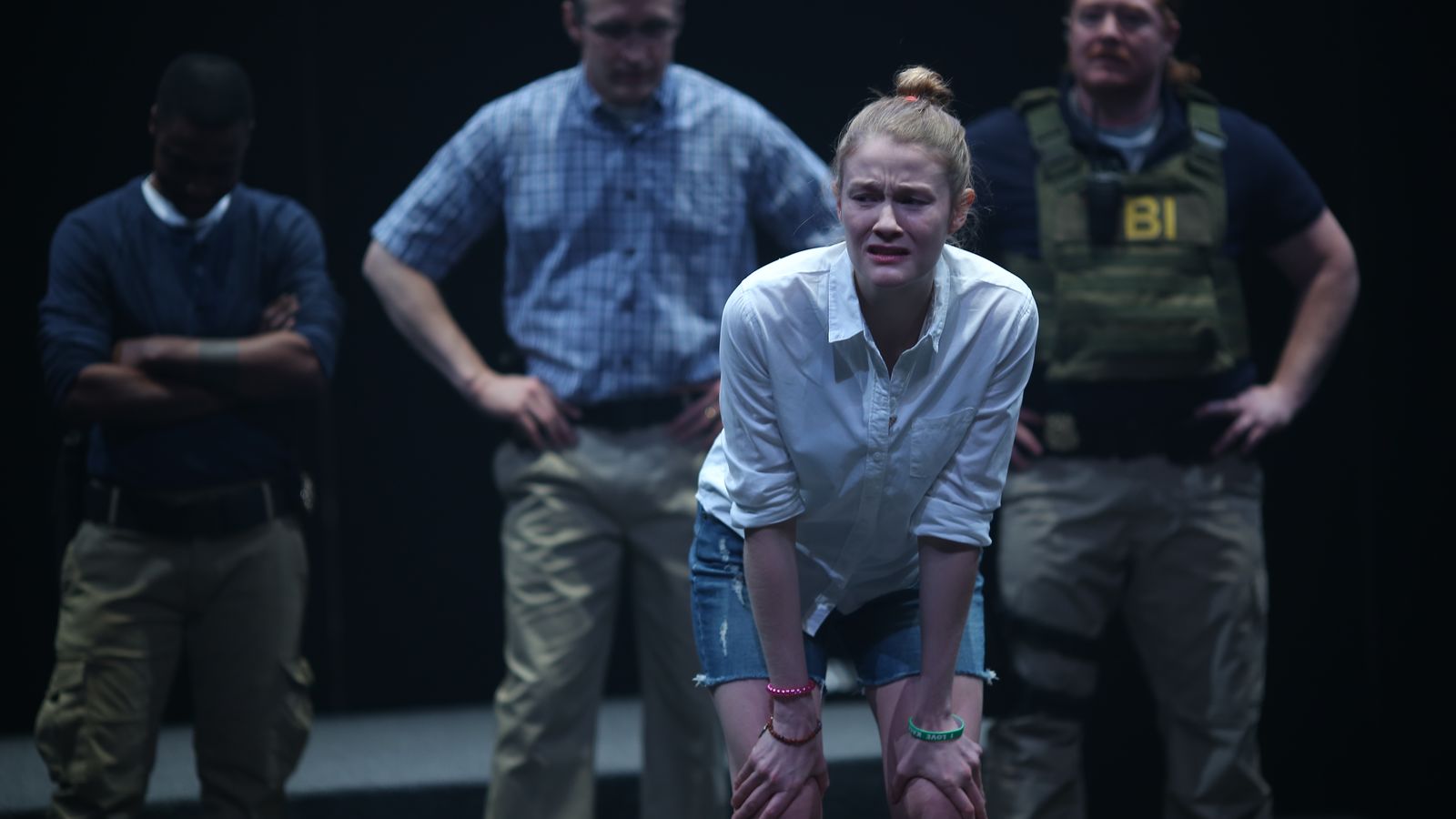
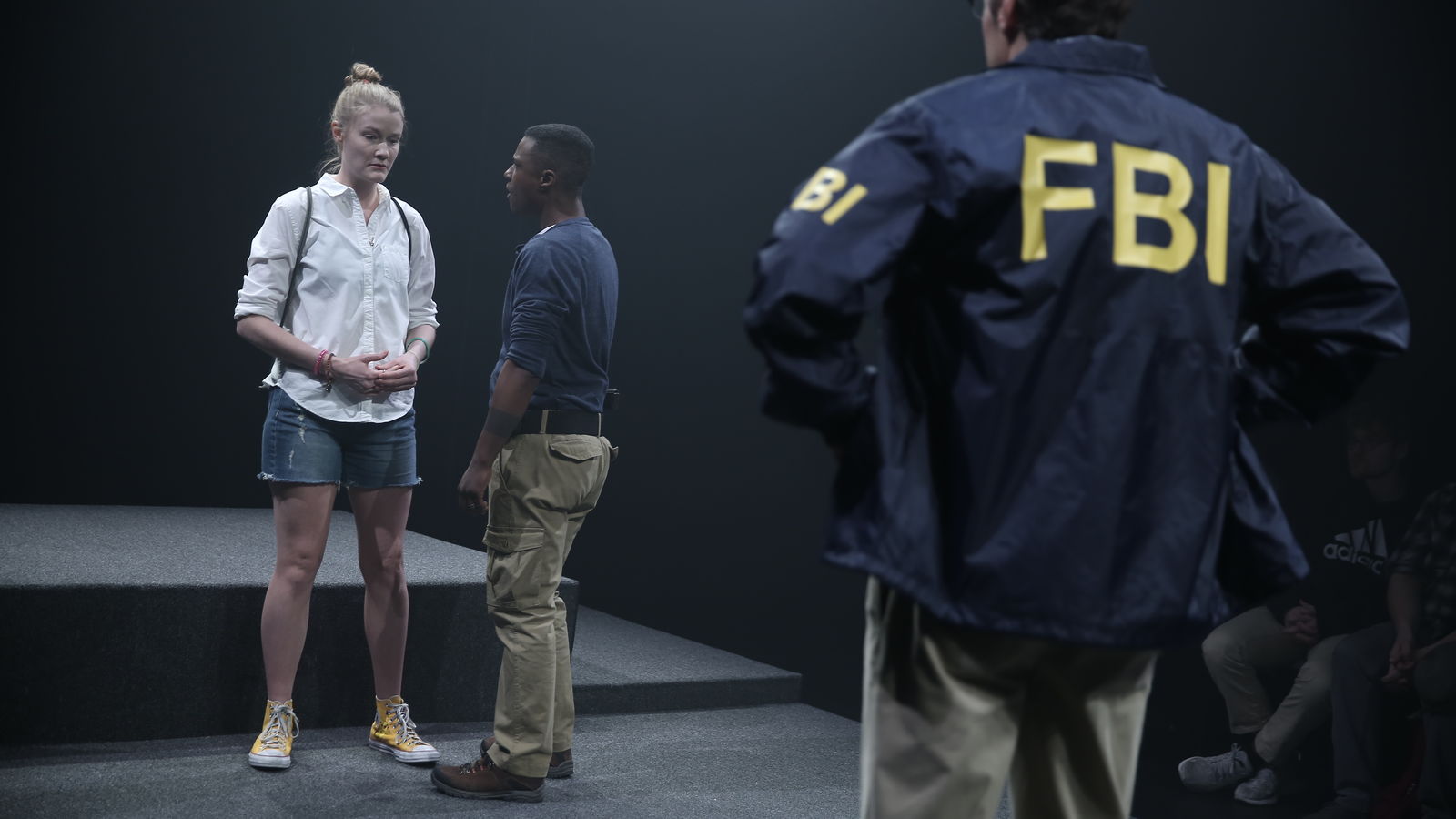
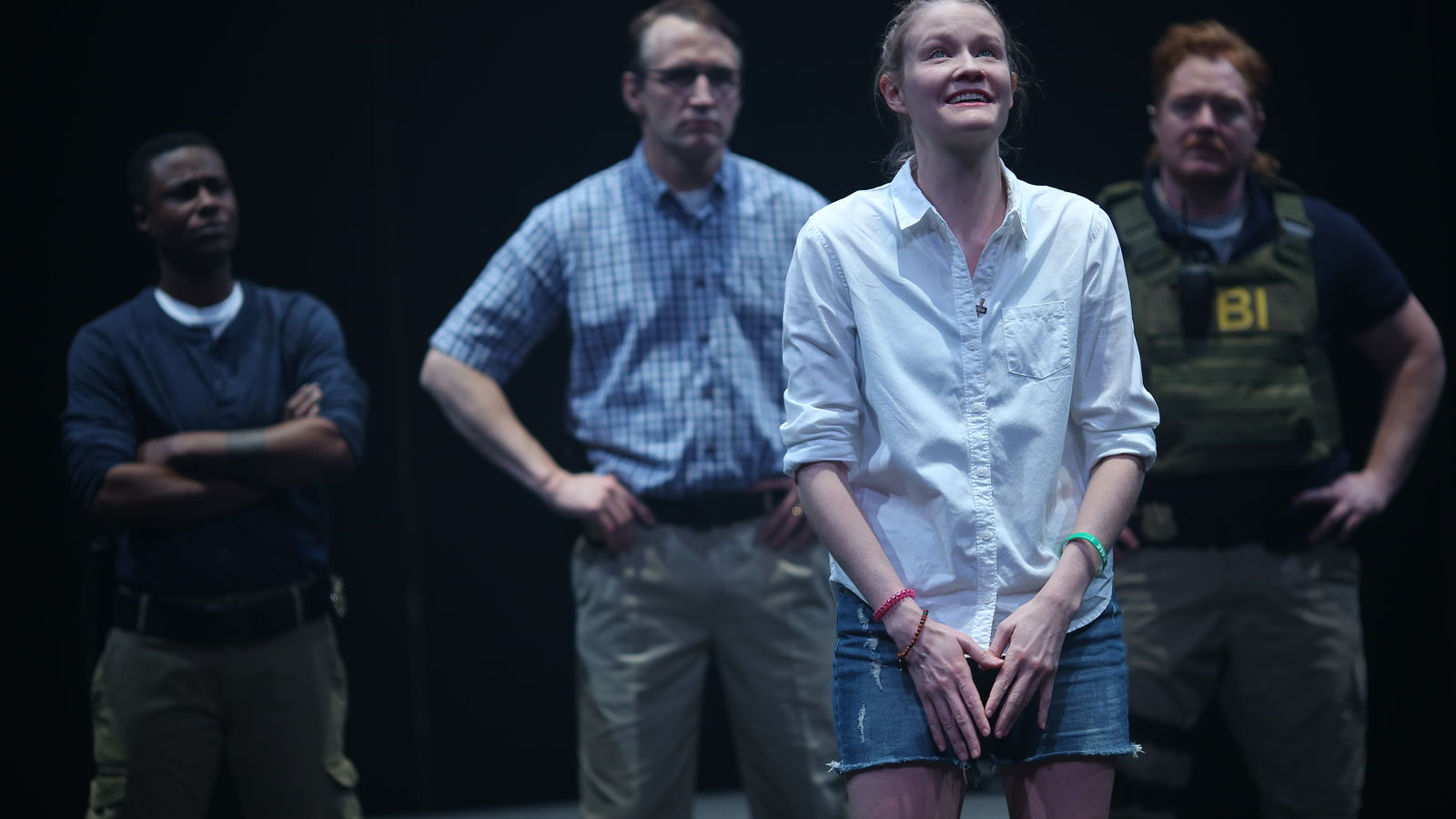
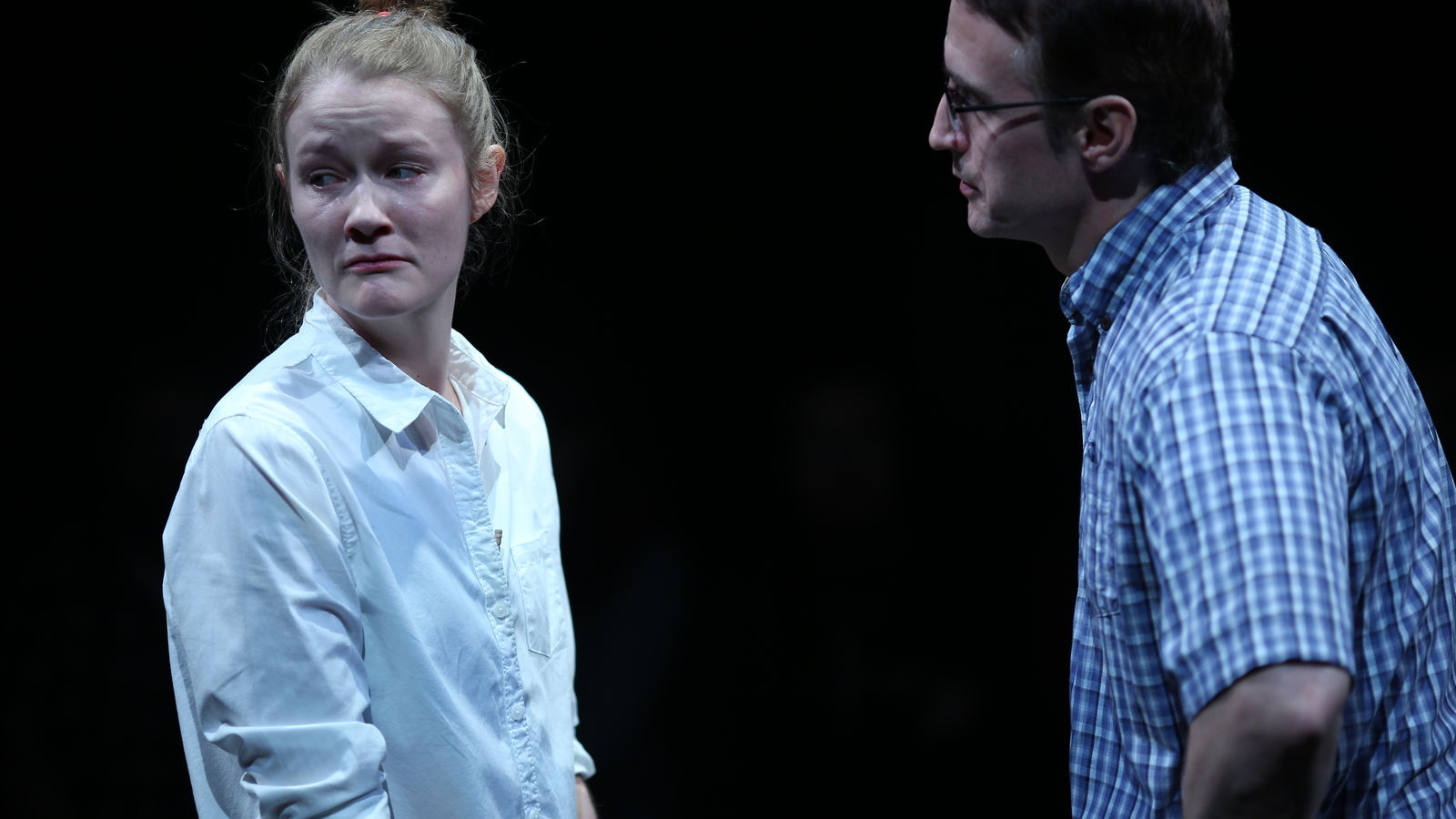
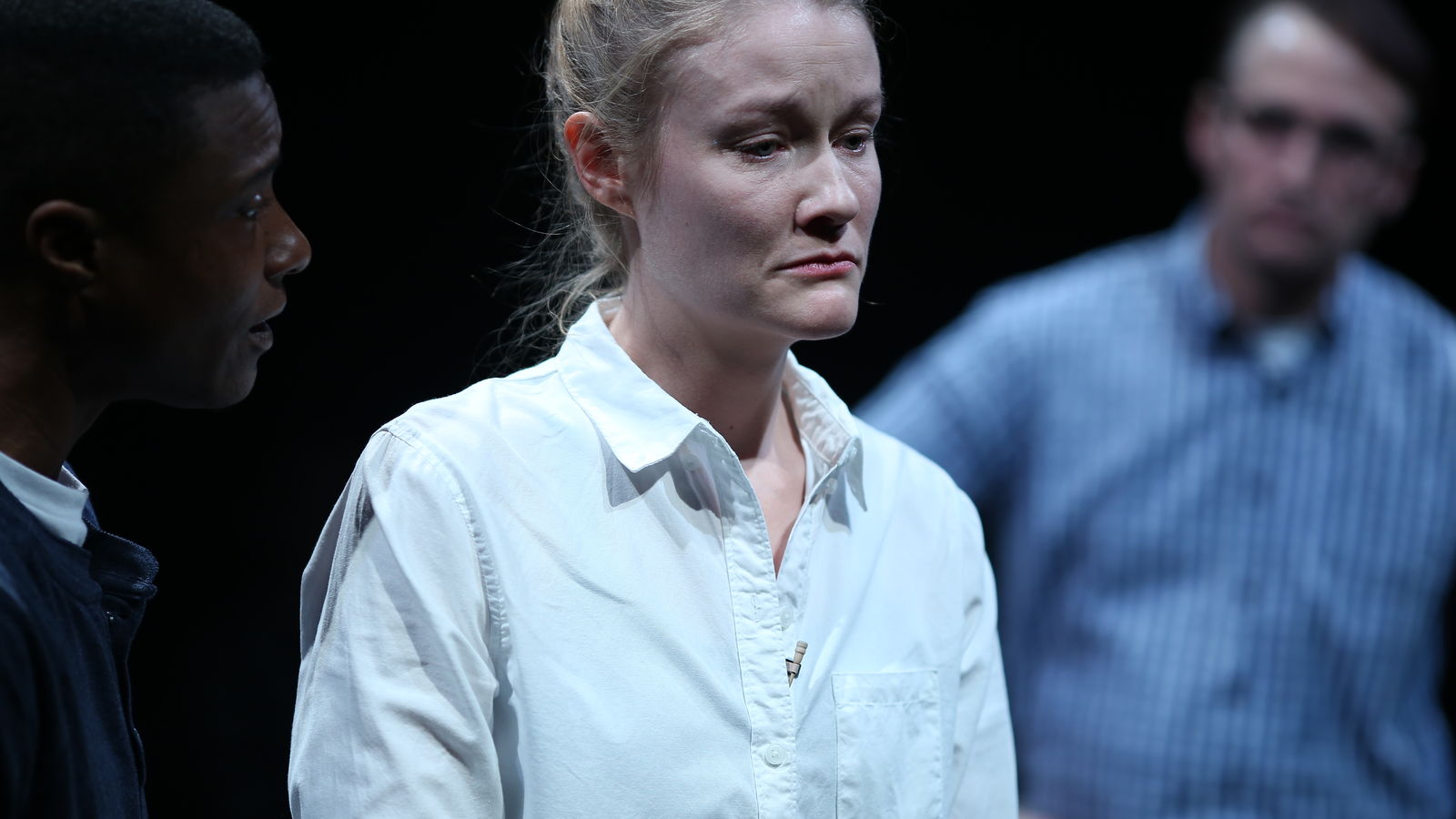
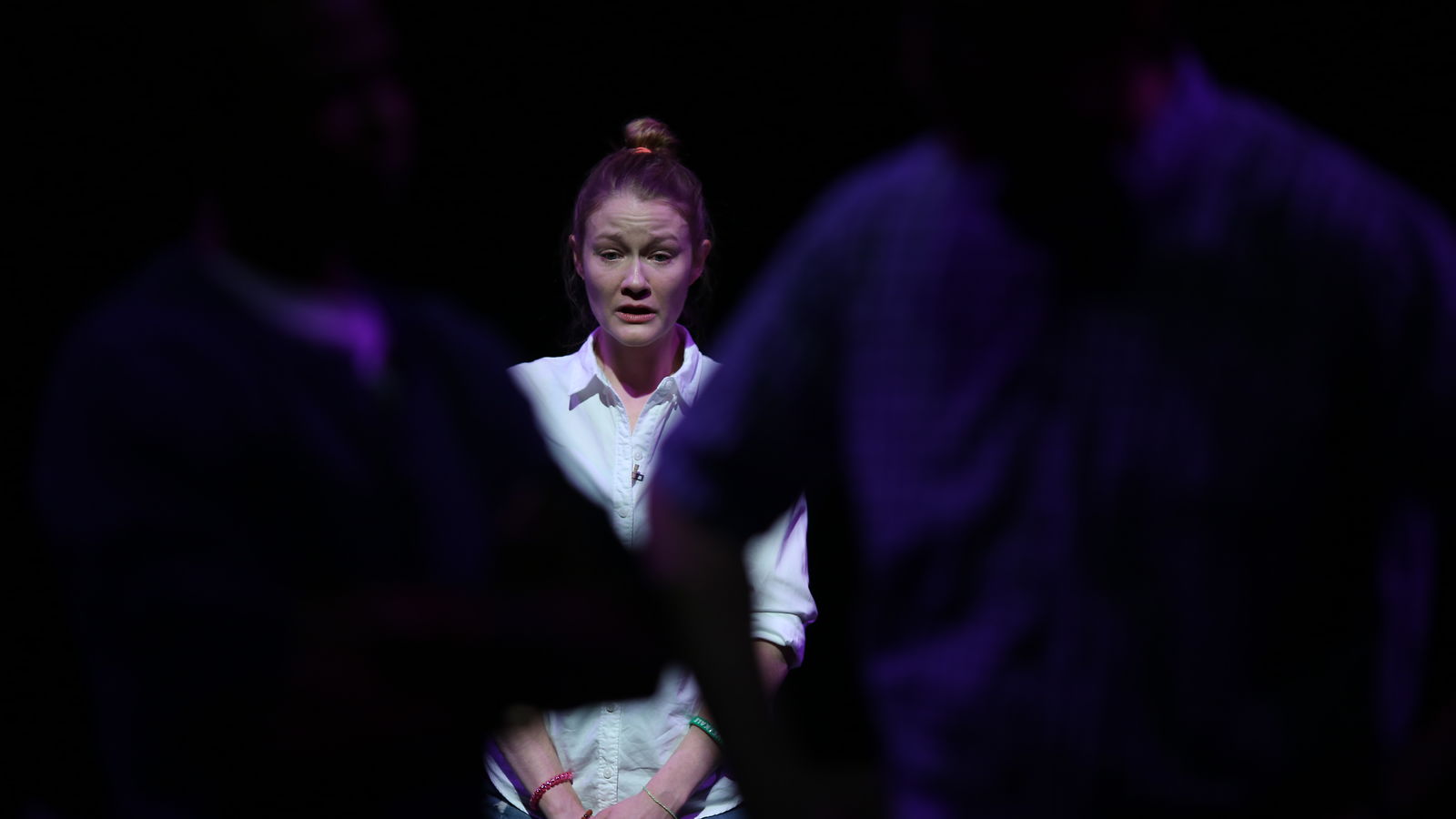
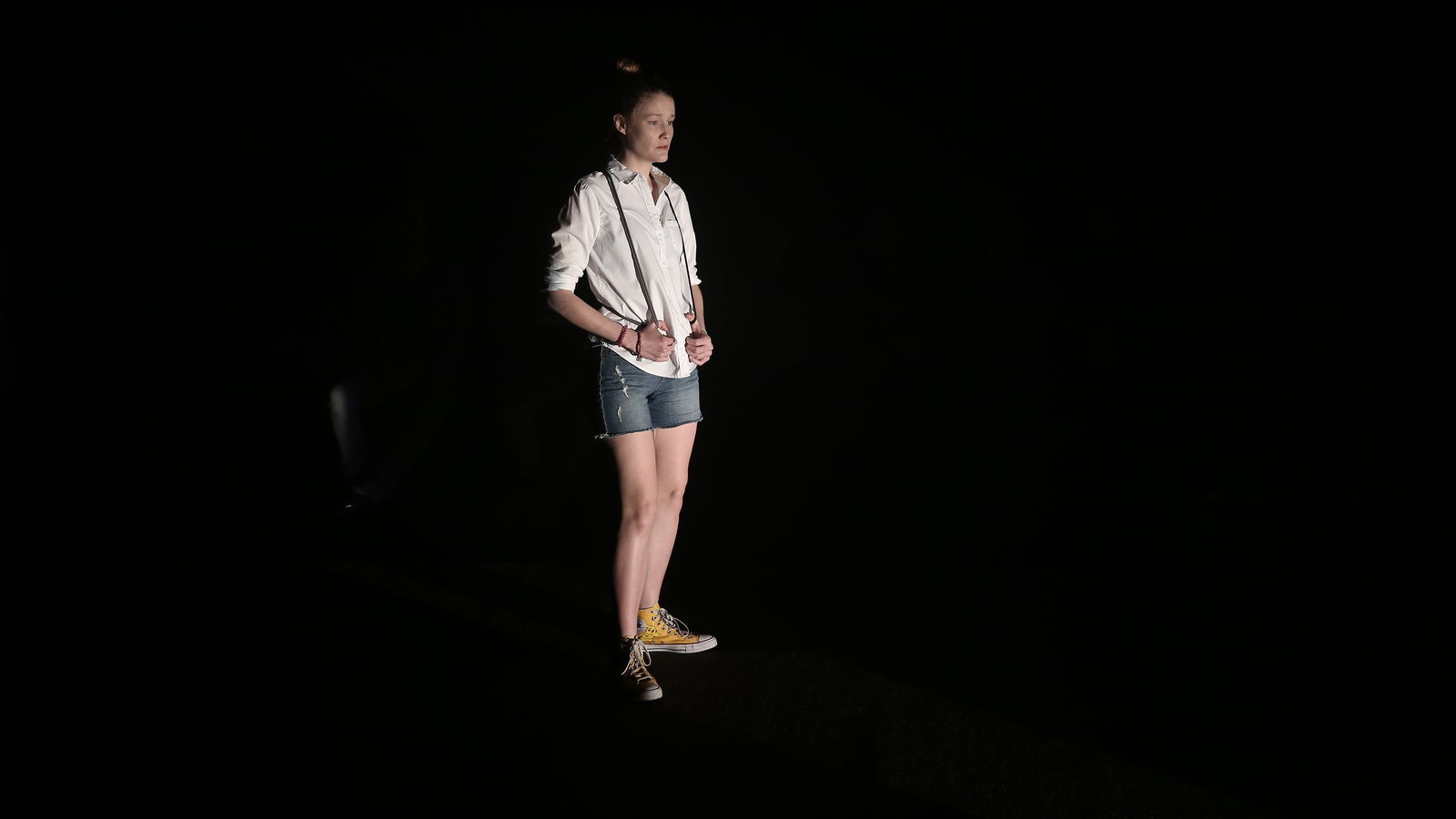
From Broadway to the Schaubühne. Tina Satter in conversation about »Is This A Room«
by Joseph Pearson
31 March 2022
Director Tina Satter was working in experimental theatre and teaching playwriting in New York City when, in late 2017, she came across an FBI transcript that caught her writerly eye. She brings its staged re-enactment, »Is This A Room«, to the Schaubühne’s FIND 2022.
»I wasn’t even looking for a script, which is something I would have written myself. Normally, I write and then direct my own work. But in this case, I stumbled on this content. A magazine article on a whistleblower named Reality Winner, with a link to the PDF of a transcript of events happening on June 3rd 2017. Reading it, I thought: this is like a play.«
Facets of the dialogue between FBI agents and Reality Winner––surprised in her home in Augusta, Georgia by officials, and later sentenced to five years under the Espionage Act of 1917 for leaking documents to »The Intercept« about Russian interference in the 2016 US election–– immediately caught the director’s attention.
Here was a strong female protagonist, a seemingly banal set-up full of tension and detailed realism (»it read to me like a Richard Maxwell play«), a script that recorded every cough and sigh (»we honour all those stutters«), and the intriguing jargon of an in-group such as a sports team or high school clique (»Heathers«: I love that movie, the way those girls talk. People with security clearance have their own lingo, lots of words you don’t understand but in context they work«).
Satter continues, »I thought of it as a writer at first; I could be inside those words. The playwright in me responded to it. But it was the director who said: this is something we can make.«
The way theatre-makers craft their works and how that process is later formulised by theatre scholars and art writers, I’d say, usually differs. I wonder whether Satter already had any interest in the genre of »verbatim theatre«––the use of found texts as spoken material for a play––when she started working on the Reality Winner story.
She laughs, confirming my hunch, »It’s really funny. It must have been in the leadup to opening at The Kitchen [the play’s original downtown venue] when an interviewer asked me about the history of verbatim theatre. I hadn’t even thought of it. Oh right, verbatim theatre! There’s this tunnel I get into when I am working with words. That’s how I work. There’s fascinating verbatim work out there but I don’t think of myself as working the lineage. Still––there it is. It’s a verbatim play.«
»Is This A Room« is one of these rare New York experimental, avant-garde productions that made the jump to Broadway. Satter first premiered her show, with Emily Davis in the starring role, in January 2019 at The Kitchen. They moved to a commercial off-Broadway venue, The Vineyard, where they had a three-month run. It was then optioned for Broadway, a deal that was secured in June 2021 for a run starting that September.
»I’m still processing the Broadway run: such a fast and furious and potent moment. In many ways, it happened so quickly.«
I suggest, »Many avant-garde filmmakers worry that a Broadway production, with its commercial expectations, can change the initial intent and aesthetic of a production.«
Satter replies, »Broadway was never the dream. I started downtown, in that corner of New York City, in that contemporary avant-garde scene. I looked to the model of the Wooster Group, the New York City Players. We aspired to venues like The Kitchen where we premiered, or PS New York, Walker Art Center, REDCAT in LA. And then, for the show to have a life, there’d have to be international touring, like to FIND. I never thought commercially. I remember when I had a breakfast with the Broadway producers and they said that maybe our main actor, who had garnered all the great reviews, could be replaced by a movie star! But we weren’t going to replace our extraordinary actors. It was essential to keep working the way I wanted to work and, in the end, luckily, no one ever really demanded that the show be different. Maybe it’s because ours was a low budget endeavour and we needed to think more about translating it to a physically bigger house. Then, I felt under immense pressure for the show to succeed, and we had to remind ourselves it had already been well-received at The Kitchen and the Vineyard. Thankfully, for our peace of mind, it was extremely well-reviewed, with the show still looking like it did at The Kitchen, with our production values and aesthetic, and with no movie stars.«
»This is unusual for a New York avant-garde production––«
»What I can say about avant-garde New York now is that there are fewer places to support the kind of early, more DIY experimental works that lead into the avant-garde. There’s less real estate even than when I came up. And I’m not the original guard. Richard Maxwell was ten years before. The Wooster Group started in the 70s. There was Elevator Repair Service. When our group came into being, as Half Straddle, in 2008-9 a lot was already gone. I talk to young artmakers all the time: and they ask us, how did we do it? You fight. Many playwrights and theatre-makers in the US have been moving to TV. There’s so much more money, and that’s turned the landscape. The blood, sweat, and tears, and martyrdom necessary to make the truly weird avant-garde is not there like before. There’s less space and hunger for it, because you can say: I am a good writer, and I have good ideas, and I can do that on HBO.«
»You’ve mentioned your lead actor and I wonder whether, in the preparation for the play, she had any contact with the real Reality Winner.«
»To make the play originally: we couldn’t talk to Reality. She was in prison. And we only had the written transcript, not the audio of her encounter with the FBI. Emily Davis had two back and forth emails with her, like pen pal letters. But very purposefully, we didn’t want to ask her about that day. I was like a weird dance. And it took me a while before I really formed: these are real people! Reality’s mom contacted us a couple of months into working on the play, writing me out of the blue: »I heard you are working on a play about my daughter.« I was so worried she would say »please stop« but she gave us this gift: an amazing endorsement to do the show. She saw it the first night we performed. She was so very moved by the play. It was an emotional experience to know we were all doing it with integrity.«
I say, »I can’t help but think of it like walking into the page of a book one’s been reading and meeting the characters. There’s something magical about this encounter––«
»Cut to when Reality gets out of prison, and we could talk to her too! And I did. I remember being nervous. »Now I will talk to her.« The first time I saw her on Zoom, I froze. She, of course, looks different from our actress. More different than I imagined, and it was weird how I’d imagined her for so long. Then we talked and continued to be in touch and there was this hope she could come to the Broadway run. But she is not allowed to travel. Her ankle monitor is off now but she is still at her mother’s.«
»Did you think of your play as political activism? To free and exonerate Reality?«
»I will tell you that living in the US, when we started working on it in 2018, there were so many questions about Trump and the rise of the extreme right, also internationally. The leadup to Trump’s election also asked many questions of artists. Do I still do art? Do I become an activist? I thought about this a lot. And I thought: I better keep doing what I’m doing. I’d done a lot of work with trans actors, queer/female people, and I thought that if I stuck to my instincts, I could put less-seen things on stage. And I think this piece is offering something fascinating and important, to see the United States at work in a private citizen’s home. It’s not my artistic aesthetic to push this show as »Free Reality« but it felt important to all of us to engage with content. To think about what it means to whistleblow, or to have a whole class of people with high-level security clearance in a country, or––the big takeaway––to think about how outdated the Espionage Act is. Some will say Reality’s a traitor. But I want to show that some people have no recourse to certain defences. I wanted to be true to the document we were staging and to reflect on what happened in a very small room.«
Is This A Room
(New York)
by Tina Satter
Director: Tina Satter
Stage B
Premiered on 31 March 2022
Pearson’s Preview

Archive
April 2023
FIND 2023
Nostalgic, Not Sentimental
The Wooster Group as »Artist in Focus« at the Schaubühne
April 2023
FIND 2023
Kuro Tanino at the Sea’s Edge
»Fortress of Smiles» at the Schaubühne’s 2023 FIND Festival
| Page 1 of 10 pages |
